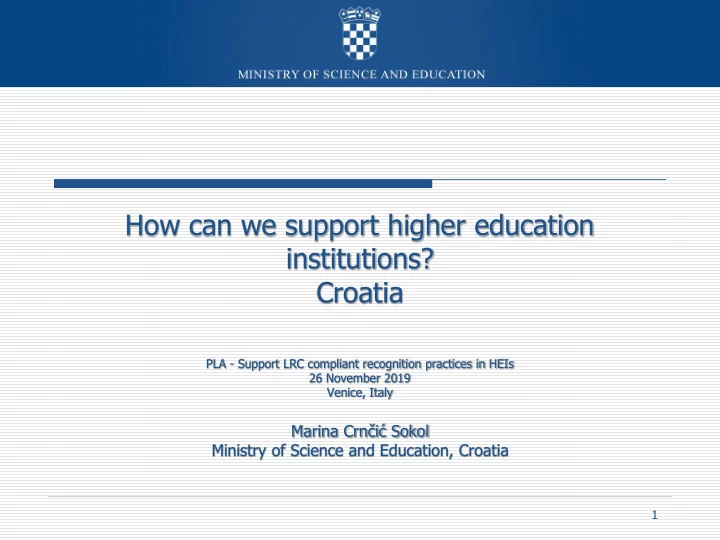

How can we support higher education institutions? Croatia PLA - Support LRC compliant recognition practices in HEIs 26 November 2019 Venice, Italy Marina Crnčić Sokol Ministry of Science and Education, Croatia 1
RECOGNITION AND HIGHER EDUCATION The procedure for recognition of education qualifications in line with the Lisbon Recognition convention as of 1 July 2004 The Act on the Recognition of Foreign Educational Qualifications (OG 158/2003, 198/2003, 138/2006, 45/2011) defines competent authorities, recognition procedures, conditions for the recognition, appeal procedures ... 2
RECOGNITION AND HIGHER EDUCATION Recognition for the purpose of continuation of education ( academic recognition ) under the authority of higher education institutions Recognition for the purpose of employment (professional recognition) under the authority of the Agency for Science and Higher Education, ENIC/NARIC Office Recognition of professional qualifications is under the authority of chambers or other relevant institutions 3
RECOGNITION AND HIGHER EDUCATION Higher education institutions have developed their own legal provisions in line with the Act the Recognition of Foreign Educational Qualifications Academic recognition is centralized (academic recognition offices and recognition committee) Recognition practice and decisions are inconsistent and often unfair (appeal procedures) Clear need to provide assistance and support to HEI’s 4
FAIR project Project Focus on Automatic Institutional Recognition (FAIR) The goal of the project was to improve institutional recognition procedures by implementing elements of automatic recognition 6 countries: Belgium ( Flemish Community ), Spain, Italy, Germany, the Netherlands and Croatia 4 universities from each country - Croatian universities: Zagreb, Osijek, Rijeka, Split Activities: assessment of existing practice, recommendations for improvement, implementation, impact assessment 5
FAIR project Findings and recommendations for Croatian universities: Procedural separation of recognition and ◼ admission is a challenge Time consuming procedures with an uncertain ◼ outcome Evident lack of information for applicant in ◼ English language ( institutional admission requirements and procedures and legal provision ) The need to develop procedures for recognition of ◼ prior learning and admission of refugees without documentation 6
EPER project Duration of the project: 1 May 2019 – 30 April 2021 Project partners: Bosnia and Herzegovina, Montenegro, North Macedonia, Serbia, Croatia Activities: Revision of legislation in Croatia ( enhancement of procedures ◼ for academic recognition, quality assurance ) Support to cooperation in recognition procedures in South ◼ East Europe ( capacity building, peer learning ) Implementation of Council of Europe Recommendation on ◼ Recognition of Qualifications Held by Refugees, Displaced Persons and Persons in a Refugee-like Situation 7
The synergy between EPER and FAIR project EPER project will support higher education institutions: HEI’s self -assessment in reference to FAIR recommendations and identifying challenges and obstacles in implementation of recommendations Capacity building workshops : improve procedures for academic recognition and develop ◼ quality assurance ensure that institutional recognition procedures are more ◼ consistent and transparent include elements of automatic recognition in academic ◼ recognition procedures 8
ENIC- NARICs support to HEI’s What can be done by ENIC/NARIC office? Lisbon Recognition Convention principles mostly embedded ◼ in national and institutional legislation but still room for more/better understanding Provide assistance and advice to HEI’s to develop clear and ◼ efficient recognition practice Create conditions for mutual learning and exchange of ◼ positive experience/best practice between HEI’s Improve the role of quality assurance in recognition ◼ Stimulate discussion and focus minds… ◼ 9
Thank you! marina.crncicsokol@mzo.hr 10
Recommend
More recommend